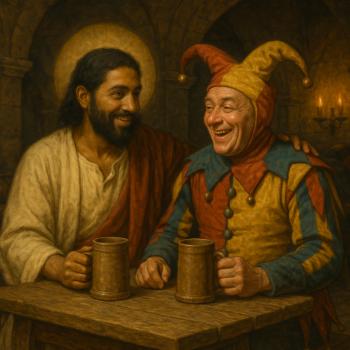Lest you think mystical encounters happened only in the Middle Ages, let's take a look at a life-transforming epiphany (Divine manifestation) that occurred in the midst of the twentieth century to the best-selling monastic writer Thomas Merton. Merton's epiphany took place right in the heart of downtown Louisville, Kentucky.
On a late winter day in March 1958, the monk had come to the city for a business errand. (Members of his order typically do not leave the monastery unless there is a good reason to do so, like conducting business or going to the hospital.) As he came to a street corner in the middle of the bustling shopping district, Merton suddenly felt overwhelming love for all the people passing by, whom he described as "shining like the sun" in his vision. But this was more than some mere momentary fancy. Merton realized, in that flash of insight, that no matter how important it was for him to be a monk totally devoted to a life of prayer, meditation, and contemplation, he had an even higher calling as "a member of the human race."
Merton saw, at the center of every human being,a point or spark which belongs entirely to God, which is never at our disposal, from which God disposes of our lives. . . [it] is the pure glory of God in us. It is so to speak His name written in us . . . like a pure diamond, blazing with the invisible light of heaven. It is in everybody, and if we could see it we would see these billions of points of light coming together in the face and blaze of a sun that would make all the darkness and cruelty of life vanish completely.
Merton calls the point or spark le point vierge, from the work of a French philosopher named Louis Massignon. In his writing, Merton doesn't translate the term, which literally means "the virgin point" or perhaps "the virgin heart." It's virgin in the sense of a kind of profound spiritual innocence—what Merton calls "untouched by sin and illusion." This isn't a particularly new idea. Others have spoken of this untouched, virgin point. Mystics before Merton have called it the apex of the soul, the transcendent ground, or the inner light. He realized that, emerging out of the point vierge, everyone shines with a spiritual light that, if we could only see it, would even tempt us to fall down and worship one another.
As a result of this shimmering moment of epiphany, the entire focus and direction of Merton's writing changed. Whereas before, almost all of his books had consisted of fairly straightforward, ordinary explorations of Catholic piety, after his epiphany, Merton began to write more about the pressing social and political issues of the day—race relations, economic injustice, the dangers of the arms race. He also became increasingly interested in interfaith dialogue, and began to explore the points of connection between Christian monasticism and the spirituality of Judaism, Islam, and Buddhism.
I've chosen these three particular stories about awakening for two reasons. First, because all three involved writers, so it is easier to compare their different encounters with the mystery simply by considering how their moment of awakening changed each one's relationship with writing (but in strikingly different ways). But please don't get the impression that spiritual awakening is necessarily about writing just because all three of these mystics happen to be authors! It only stands to reason that the mystics from the past whose words we have are, naturally, the ones who bothered to write them down. Thus our knowledge of the great mystics of history is going to be skewed toward writers, the ones who put pen to paper.
It is interesting to compare these three writer-mystics because their rendezvous with mystery impelled them all to change their relationship with their writing—although in distinctive ways. Aquinas, the celebrated philosopher, found that his moment of ecstasy humbled him into silence. Julian, the simple woman, discovered her voice and began to write as a consequence of her showings. Merton, perhaps nearly as renowned in his day as Aquinas was seven centuries earlier, found transformation in the wake of his epiphany—he kept on writing just as before, but his words explored new terrain, taking on a new urgency and purpose.
What can we learn from these stories of awakening? To reiterate one obvious point: a mystical awakening changes things. It makes a real, observable difference in peoples' lives. Out of the longing for God that mirrors God's longing for us, a single, unexpected moment of insight revolutionized each of these mystics' lives forever. Imagine what kind of difference a spiritual awakening could make in your life.




